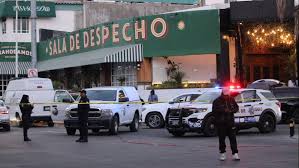His book Soldiers and Kings: Survival and Hope in the World of Human Smuggling is an anthropological study of a migratory phenomenon that has left an unknown number of dead and missing people across thousands of kilometers.
Jason de León recently won the prestigious National Book Award for nonfiction in a category that included the legendary writer Salman Rushdie. Shortly afterward, he posted on X (formerly Twitter), where he shared that he had been detained at an airport.
“The irony of once again being ‘randomly’ selected for secondary inspection at TSA PreCheck and then having to explain why I have an eight-pound bronze statue in my backpack,” he explained in his post, continuing…
“TSA Agent: You wrote a book? What’s it about?” he recalled.
And yes, it is ironic for a UCLA professor and renowned anthropologist, as well as a winner of the MacArthur ‘Genius’ Grant. The MacArthur Foundation defines his work as follows: “Combining ethnographic, forensic, and archaeological evidence to bring to light the human consequences of immigration policy at the U.S.–Mexico border.”
His book Soldiers and Kings: Survival and Hope in the World of Human Smuggling is an anthropological study of a migratory phenomenon that has left an unknown number of dead and missing people across thousands of kilometers.
Never has immigration been such a central issue in U.S. politics, especially with the incoming president, Donald Trump, threatening to carry out mass deportations of undocumented individuals.
Anthropologist and author Jason de León said the problem with the topic of migration is that people “peddle these very simplistic stories — and it’s a very complex issue.”
To examine the issue of human smuggling, de León spent seven years closely studying the lives of men dedicated to smuggling migrants from Central America and Mexico into the U.S.
“I’m still pretty much in disbelief,” said de León.
For de León, the award “felt like a major win” for a book about elements of migration that are “totally overlooked,” according to different stories.
“I ended up writing a book about a bunch of broken, beat-down, mostly young men who taught me so much about what it’s like to try to survive,” de León said. “I think it’s a testament to just listening. I wanted to go in and listen to those guys. And once I did, and accepted that as my role as a listener, I just felt like I learned so much. I’m super grateful for the experience and for the fact that those guys all really wanted to share their very important stories.”
To examine the issue of human smuggling, de León spent seven years closely studying the lives of men dedicated to smuggling migrants from Central America and Mexico into the U.S.
The book, released in March, provides a close look at the rarely seen world of human smuggling and its connection to undocumented migration while offering a more nuanced portrait beyond the stereotypes of those involved in smuggling.
“We cannot begin to grapple with this issue until we understand all its complexities. That’s talking about smugglers, talking about the political economy of undocumented migration — and people don’t want that. They want to ignore these things. They want to say the solution is to build a wall… the world doesn’t work like that,” he said. “For me, as a social scientist, as an anthropologist, my goal is to show people the reality that actually exists.”
With this goal in mind, de León said he hopes the stories compiled in his book will help improve people’s understanding of immigration issues and equip them with the knowledge necessary “to ask better questions of our leaders” and “begin to address these issues in a more nuanced way.”
The son of immigrant parents from Mexico and the Philippines who had served in the Army, de León mostly lived in Long Beach, California, and the Rio Grande Valley in Texas — constantly crossing the border into Mexico and growing up with relatives who were undocumented.
Later in his professional career, de León became the executive director of the Undocumented Migration Project, a research nonprofit that seeks to raise awareness about global migration issues while also assisting families of missing migrants who are looking to reunite with their loved ones.
“Migration is a laboratory. Everyone knows there is a system of poverty that drives them to migrate, they know about the violence in their countries, and the need for these migrant workers in the United States,” he told Parriva in a previous interview.








